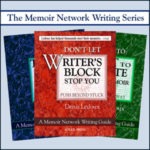We'd love to have you access this content. It's in our members-only area, but you're in luck: becoming a member is easy and it's free.
Already a Member?
Not a Member Yet?
Have you ever asked, “Who cares about my memoir?” A perennial, and perhaps inherent, challenge every memoir writer faces is that of audience. Specifically, every writer is saddled with the incapacitating doubt that there is an audience for his/her memoir.
Have you ever asked, “Who cares about my memoir?” Certainly, a lot of people have!
A perennial, and perhaps inherent, challenge every memoir writer faces is that of audience. Specifically, every writer is saddled with the incapacitating doubt that there is an audience for his/her memoir.
“Who will want to read my memoir? Who cares about my memoir?” asked enough times can bring your writing to a halt.
Of course, it’s a good question. Who will want to read about someone else’s life or even—horrors!—MY life.
“But,” you gasp, “isn’t that what a memoir is—the story of my life? What’s the point of writing if no one is interested?”
[Free Membership required to read more. See below. ]
 What would happen to the memoir conversation if…
What would happen to the memoir conversation if…
- …you took a moment to present this informative post to your friends and family by linking this article on your social media? Just a click. It’s so easy.
- …you reposted this article on your own blog or website? It’s free and you’d both have some valuable content to boost your blog’s reputation and you would be providing your readers with valuable guidance. For the best procedure on how to do this, click here.
- …you subscribed to our YouTube channel?


No comments yet.